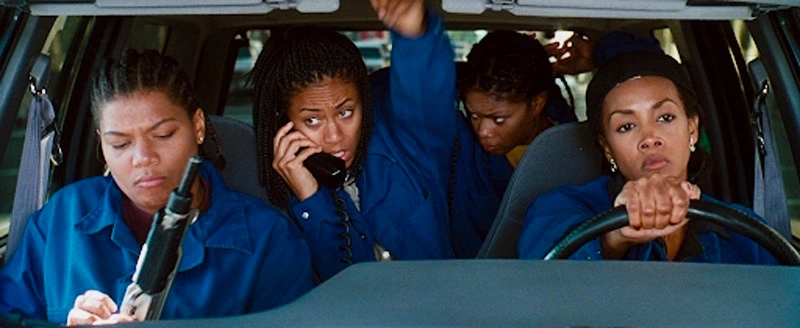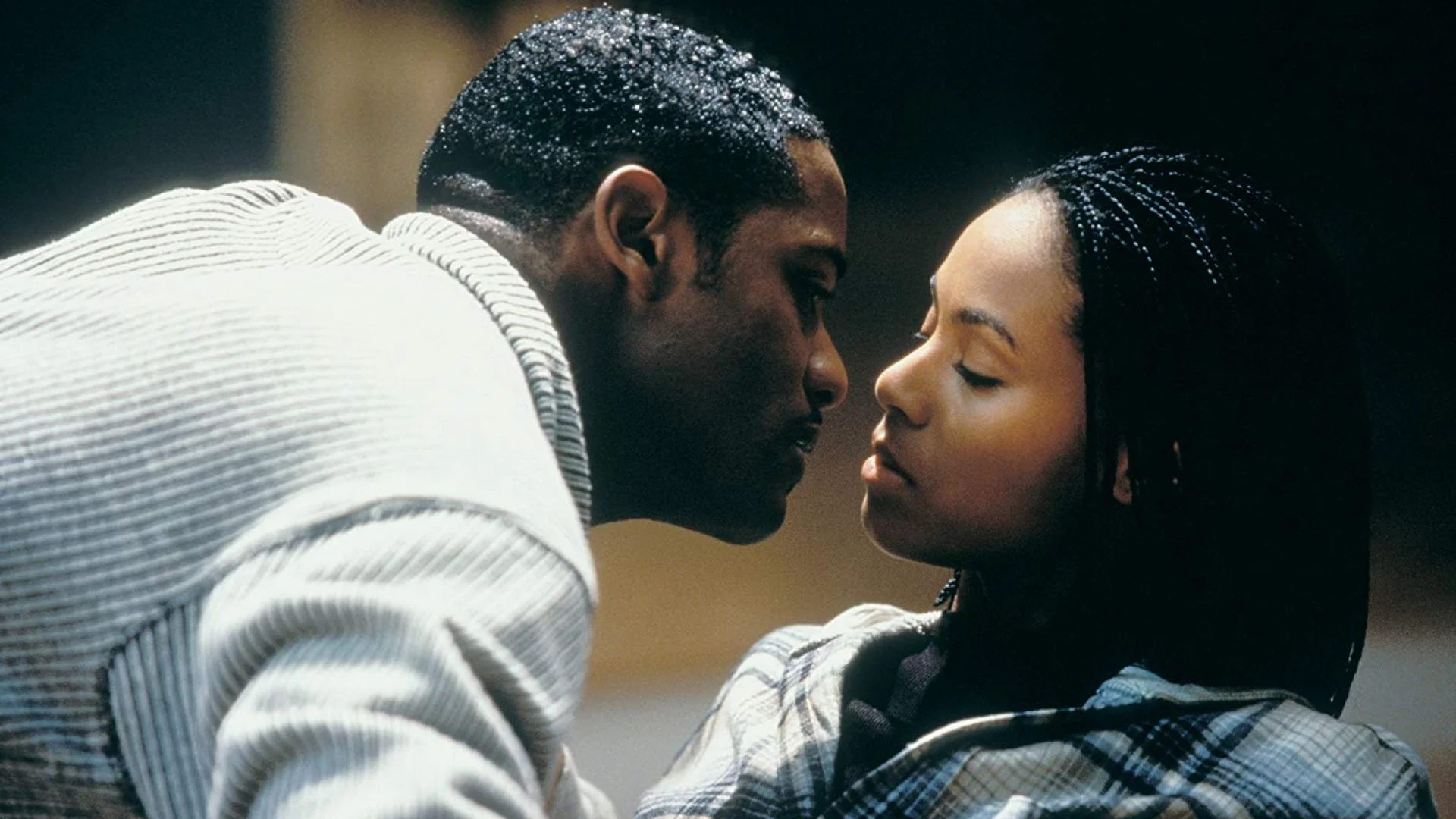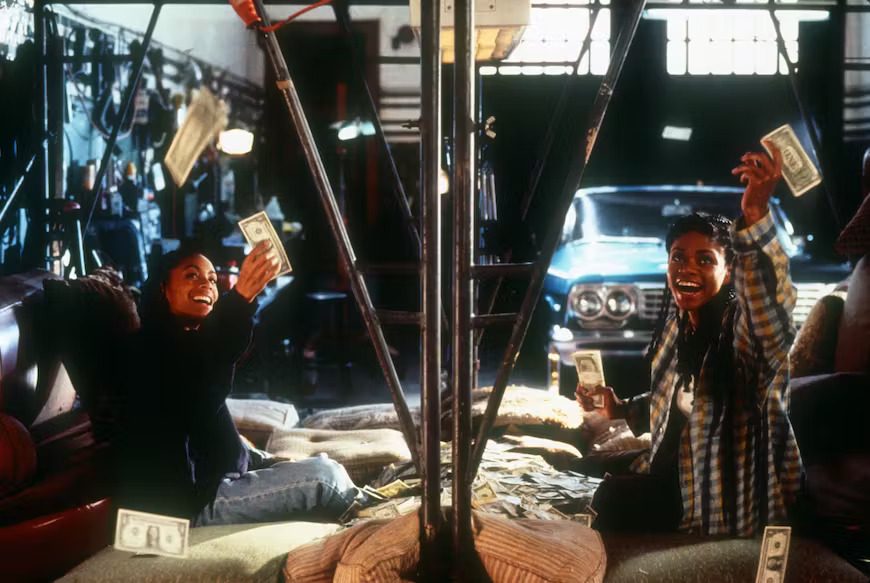Set It Off is set against the backdrop of the Rodney King uprising and the Clinton era. F. Gary Gray never mentions the politics of its characters as much as he explores the myriad of ways they must struggle with the everyday reality they find themselves in. In other words, you can call it apolitical, but doing so would miss the richness of what Gray and his collaborators are trying to do.
In a way, Set It Off is like a noir. Though Gray and his DP Marc Reshovsky favor a style more akin to music videos, which Gray cut his teeth on, the feeling of fate and characters being trapped by their decision drives the story. The four women, Stony (Jada Pinkett Smith), Frankie (Vivica A. Fox), T.T. (Kimberly Elise), and Cleo (Queen Latifah), are working-class Black women constantly coming up against barriers erected by systems purportedly designed to help them but which in reality keep them over-worked, over-stressed, and underpaid.

The screenwriters Takashi Bufford and Kate LanierTakashi paint a vivid picture of life in the projects, laying the groundwork so we can empathize with the four women and their fateful choice to rob a bank. The writers and Gray do not shy away from the thrill-seeking from robbing banks, the living on-the-edge act of defiance it offers these four who have been ground down to the nub.
The script is almost noir-like in its construction as well. Frankie works at a bank until it gets robbed by Darnell (WC), a young man she recognizes from her neighborhood. Because of this, she knows the man she is fired. Stony, who is raising her little brother Stevie (Chaz Lamar Shepherd), sells her body to the owner of a local car dealership Nate (Charlie Robinson), to pay his tuition fees; an act that will ultimately prove futile as the LAPD will gun down Stevie as he walks home from visiting his friend Darnell.
Meanwhile, T.T. is a single mom who struggles to find ways to raise a child and keep her low-paying job working as a janitor for Luther (Thomas Jefferson Byrd). She works with Stony and Cleo, a loud and proud butch lesbian, and soon will be joined by Frankie in desperate need of a job. Takashi and Bufford never veer into girl-power anthems, though even though the four are friends, the script and Gray keep the characters flawed.
Cleo is rash and, at times, staggeringly violent. In an argument with Stony, she pulls a gun on her and holds it to her face. When Stony slaps her, Cleo has to be restrained and talked down by Frankie, the de facto leader who may not have the level head everyone assumes. Stony seems the most clear-eyed, understanding how much the four are playing with fire.
Set It Off may exist in a world of heightened drama, but when you are poor, every setback feels like the end of the world. You must overcome yet another obstacle to make it through the day. T.T. having her son taken away by child services because of an incident at work, Frankie being fired after being promoted, and being unable to find work at any other bank because of being unfairly under suspicion because she grew up in the same neighborhood as the robber, Stony forced to sell her body for a salary advance only to see her brother gunned down by the cops because he had the same hairstyle as the robber, all while working dead-end jobs that have no future is enough to drive anyone mad-nevermind to a life of crime.
Then there’s Queen Latifah’s Cleo. Easily one of her best roles, her Cleo still feels daring even in today’s climate-perhaps especially because of today’s climate. No one ever labels her as gay, but when she is as out and loud as Cleo, no one needs to. Latifah plays Cleo with a swagger and vivacity that gives Gray’s film so much of its raw energy. Modern movies have more Queer characters, but often they will label them because if they didn’t, no one would know. Whereas Gray and his writers make Cleo’s queerness self-evident, you can not ignore it because she refuses to let you. Whether it’s her flirting with Fox’s Frankie and being told no or how she dotes on her girl toy Ursula (Samantha MacLachlan), a character that would, in any other film, be the femme fatale; but here is Cleo’s mute arm candy.
However, Ursula’s silence is one of the film’s baffling stumbling blocks. For a movie about four women, especially one that is so cognizant of the agency of these women, it seems off that Ursula never speaks.
Gray masterfully weaves action set pieces throughout Set It Off. One of the more memorable ones includes Cleo having to get a new get-away car and crashing through the bank’s walls. Gray and Reshovsky’s camera, along with John Carter’s cuts, make the action dynamic by allowing us to take in the geography of a frame. For example, Gray and Reshovsky set the camera outside the bank seconds before Cleo, and the others come crashing through the window. We know what is about to happen, but rather than editing it as a series of chaotic images, Carter and Reshovsky, let the moment breathe for a few seconds, building anticipation.

The scene is playful as the usually well-planned foursome encounters a series of hitches to their plans. A houseless person blocks the escape route, and the cops have to be called to deal with it, which ratchets up the tension because now the escape route is blocked. It serves as a sign of things to come when the final robbery goes off the rails.
Amidst all of this is Blair Underwood’s character Keith, Stony’s love interest. The two meet while Stony is casing a bank, and soon the two strike up a relationship. Stony and Keith’s romance adds a hopeful dimension to Stony’s story arc. However, Underwood’s Keith is another of the film’s commentary on how Black men relate to Black women. Unlike the other men in Stony’s life, the sleazy Nate, the demanding Luther, or the insincere Detective Strode (John C. McGinley), Keith is the one man in her life that isn’t telling her she’s less than what she is.
McGinely’s Strode is a racist who doesn’t realize he’s a racist. McGinley struts through the movie chewing on a toothpick like a beaver gnawing down a tree stump as his partner, a Black woman Detective Waller (Ella Joyce), stands silently by. Waller herself is a commentary on the type of Black woman who manages to climb the ladder but does little to support other Black women.
Early in Set It Off, Fox’s Frankie is being grilled by Strode and Waller, who accuse her of being in on the first robbery. After being fired, Frankie turns to Waller and utters the line of the movie, “You didn’t even ask if I was thirsty, Sister.” Waller never disagrees with Strode, even when he accuses Frankie because she knows the robber.
Set It Off is Fox’s first starring role, and Frankie is perfect for her talents. Her Frankie has a rage that bubbles beneath the surface, threatening to explode. Fox’s performance is perfectly calibrated to show the white-hot heat of Frankie’s rage and the coolness of her tenderness. A soft heart reveals itself in moments like when T.T. backs out of the first robbery, but she gives her cut anyway because she needs it and cares for her friend.
If there is a weak link, it’s Elise’s T.T. Set It Off marks her debut, and of all the roles, hers is the least nuanced. Part of the problem is the script; little is known about T.T. outside the fact that she’s a shy single mom. However, there are moments, such as when the four sit around a table playing out a scene from The Godfather, that she brings life to T.T. It’s these little moments that hint at the depth of her talents even while the movie seems all too content in keeping her in the no man’s land between wailing and sniffling.

The final car chase is riveting from a technical standpoint but also from an emotional one. Indeed, the latter makes it as exciting as it is. We know they can’t escape, that all their choices have led them here, and now it must end. The ending is so note-perfect that even the attempt at a face turn for McGinely’s Strode doesn’t spoil it for me-though it does come close. I can buy a lot from a movie, but Strode suddenly worrying about innocents being hurt when he has done more than anyone to ensure they are harmed seems hollow.
Set It Off is uninterested in the ethics of robbing banks. Gray and his screenwriters are less interested in mythologizing these characters, ala Bonnie & Clyde, or tapping into a deep resentment towards banking institutions, ala Hell or Highwater. Instead, they are primarily interested in why these four Black women would rob a bank, their choices, and how society and the systems seem to work together to push them to the edges.
Images courtesy of New Line Cinema
Have strong thoughts about this piece you need to share? Or maybe there’s something else on your mind you’re wanting to talk about with fellow Fandomentals? Head on over to our Community server to join in the conversation!

